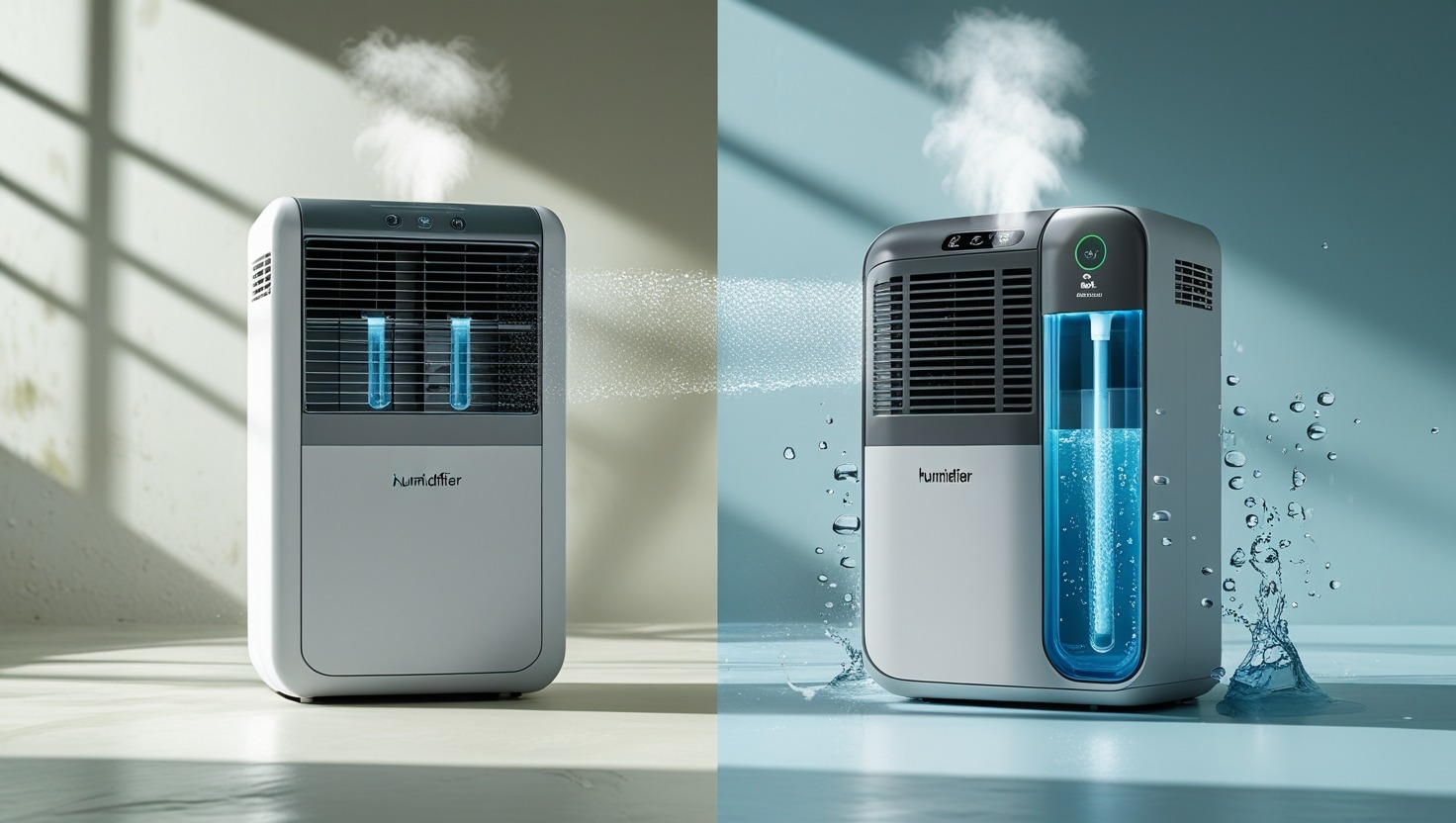
Introduction
Maintaining the right humidity level in your home is essential for comfort, health, and overall indoor air quality. However, choosing between a dehumidifier and a humidifier can be confusing. Both devices regulate humidity, but they serve opposite functions.
In this comprehensive guide, we’ll explore the differences between dehumidifiers and humidifiers, their benefits, and how to decide which one is right for your needs. By the end of this article, you’ll have a clear understanding of when to use a humidifier vs. a dehumidifier to achieve optimal air quality in your home.
What is a Dehumidifier?
A dehumidifier is a device designed to remove excess moisture from the air, reducing humidity levels.
How Does a Dehumidifier Work?
Dehumidifiers operate by pulling in humid air, condensing the moisture into water, and then releasing dry air back into the room. This process helps control dampness and prevents problems such as mold growth and dust mites.
Dehumidifier Benefits
- Prevents mold and mildew: High humidity encourages mold growth, which can cause health issues.
- Reduces allergens: Dust mites thrive in humid conditions. A dehumidifier helps control their population.
- Improves air quality: Less moisture in the air means fewer airborne allergens.
- Protects furniture and walls: Prevents damage to wooden furniture, walls, and electronics due to excess moisture.
- Enhances comfort: Reduces that sticky, muggy feeling in high-humidity areas.
Best Dehumidifier for Home
The best dehumidifier for your home depends on room size and humidity levels. Consider portable dehumidifiers for small spaces or whole-house dehumidifiers for larger areas. Brands like Frigidaire, hOmeLabs, and Honeywell offer reliable models.
What is a Humidifier?
A humidifier adds moisture to the air, increasing humidity levels. It’s especially useful in dry climates or during winter when indoor air can become too dry.
How Does a Humidifier Work?
Humidifiers release water vapor into the air through evaporation, ultrasonic waves, or heating water into steam.
Humidifier Benefits
- Prevents dry skin and irritation: Adds moisture to the air to combat dryness.
- Improves respiratory health: Helps relieve sinus congestion, sore throats, and dry coughs.
- Enhances sleep quality: Prevents dry air from irritating nasal passages and throat.
- Protects wooden furniture: Prevents cracking and warping due to dry conditions.
- Reduces static electricity: Helps prevent shocks caused by dry indoor air.
Best Humidifier for Home
Choosing the best humidifier depends on your needs. Cool mist humidifiers are great for year-round use, while warm mist humidifiers help with cold relief. Popular brands include Levoit, Honeywell, and Vicks.
Key Differences: Dehumidifier vs. Humidifier
| Feature | Dehumidifier | Humidifier |
|---|---|---|
| Function | Removes excess moisture | Adds moisture |
| Best for | High humidity areas | Dry environments |
| Health Benefits | Prevents mold, dust mites, and allergies | Helps with dry skin, congestion, and respiratory issues |
| Common Use Cases | Basements, bathrooms, coastal areas | Winter months, dry climates |
| Energy Consumption | Moderate to high | Low to moderate |
| Maintenance | Emptying water tank, filter cleaning | Cleaning tank, refilling water |
Dehumidifier vs. Humidifier: Which One Do You Need?
When to Use a Dehumidifier
- Your home feels damp and musty.
- You notice mold or mildew growth.
- You experience allergy flare-ups due to dust mites.
- You live in a humid climate.
When to Use a Humidifier
- Your skin, throat, or nasal passages feel dry.
- You suffer from frequent colds, sinus infections, or allergies.
- Your wooden furniture or flooring is cracking.
- You experience static electricity often.
Dehumidifier vs. Humidifier for Allergies
- If allergies are triggered by mold and dust mites, a dehumidifier is ideal.
- If allergies stem from dry air and respiratory irritation, a humidifier is better.
FAQs
1. Can I use a dehumidifier and a humidifier together?
Yes! If different rooms in your home have varying humidity levels, you may need both devices.
2. What is the best humidity level for a home?
Experts recommend keeping indoor humidity between 30-50% for optimal comfort and health.
3. Do dehumidifiers or humidifiers help with asthma?
Both can help, depending on the triggers. Dehumidifiers reduce allergens, while humidifiers ease breathing by adding moisture.
4. Which is more energy-efficient?
Humidifiers generally use less energy than dehumidifiers, which need to run longer to remove moisture.
5. Are there any risks?
- Dehumidifiers: Overuse can lead to excessively dry air, causing irritation.
- Humidifiers: If not cleaned properly, they can spread mold and bacteria.
Conclusion
Choosing between a dehumidifier and a humidifier depends on your specific needs. If you struggle with high humidity, mold, or allergies, a dehumidifier is your best option. If dry air is causing discomfort, respiratory issues, or static electricity, a humidifier is the way to go.
By maintaining the right humidity balance, you’ll create a healthier and more comfortable living space. Have you used a humidifier or dehumidifier? Let us know your experience in the comments below!


